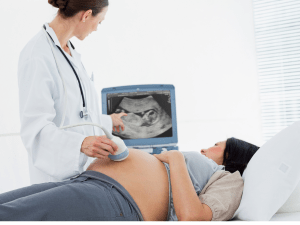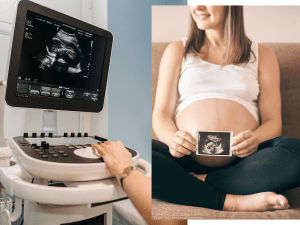If you’re pregnant, you’ve probably had at least one prenatal ultrasound.
Ultrasounds are painless and relatively quick procedures often used to check on the baby’s health.
But are they really safe?
In this post, we’ll explore how ultrasounds work, the uses of ultrasounds, what are the side effects of ultrasounds and whether or not they’re really as harmful as some people think.
We’ll also dispel some myths surrounding this standard pregnancy procedure.
So if you’re wondering are ultrasounds dangerous for babies, read on for the truth.
What are ultrasounds?

Ultrasounds, also called sonograms, are medical procedures that use high-frequency sound waves to create an image of the inside of the body.
They’re often used to check on the health of unborn babies and have been used for decades.
Ultrasounds work by sending out sound waves that bounce off the organs and tissues inside the body. The reflection of these sound waves is then converted into an image on a screen.
Uses of Prenatal Ultrasounds
Ultrasounds are commonly used during pregnancy for several reasons.
For one, they help determine the due date, can show how many babies are growing inside the womb and how much they are growing. They can also help detect any potential birth defects or problems with the baby’s development.
Other uses of prenatal ultrasounds are:
– To check the position of the baby and placenta– To detect problems with the umbilical cord
– To monitor the baby’s heartbeat
– To determine whether a woman is experiencing an ectopic pregnancy
– To measure the amniotic fluid – And many more
Types of Prenatal Ultrasounds
There are two main types of prenatal ultrasounds: abdominal and vaginal.
Transabdominal ultrasound: This is the most common type of ultrasound. It’s done by placing a transducer on the mother’s abdomen.
Transvaginal ultrasound: This type of ultrasound is used early in pregnancy when the transabdominal ultrasound can’t yet provide a clear view of the baby. It’s done by inserting a transducer into the mother’s vagina to get a clear picture of the baby.
Are Ultrasounds Dangerous?

Despite being a common pregnancy procedure, some myths revolve around ultrasounds.
Many people wonder if ultrasounds are dangerous, especially for the baby.
Here are some common ultrasound myths:
Myth # 1: Ultrasounds use radiation
Ultrasounds use sound waves, not radiation. So you don’t have to worry about the harmful effects of radiation when you get an ultrasound.
Myth #2: Too many ultrasounds can harm the baby
Another common myth is that too many ultrasounds can harm the baby. Ultrasounds only use sound waves to create images of the baby.
Therefore, there are no risks of exposure to radiation, which can be harmful, regardless of how many ultrasounds you have.
Myth #3: Ultrasound can damage the organs
Can ultrasound damage organs? This is another myth that is not true.
Ultrasounds have been used for decades, and there has never been a single case of them causing any damage to the baby’s or mother’s organs.
In Conclusion
Ultrasounds are a safe and effective way to get images of your baby during pregnancy.
They are a valuable tool that can provide important information about your baby during pregnancy.In addition, there are no risks or side effects associated with having an ultrasound, so you can feel confident and reassured that they are safe for you and your baby.
So, go ahead and book your ultrasound appointment.
If you have any questions, don’t hesitate to ask in the comments below.




